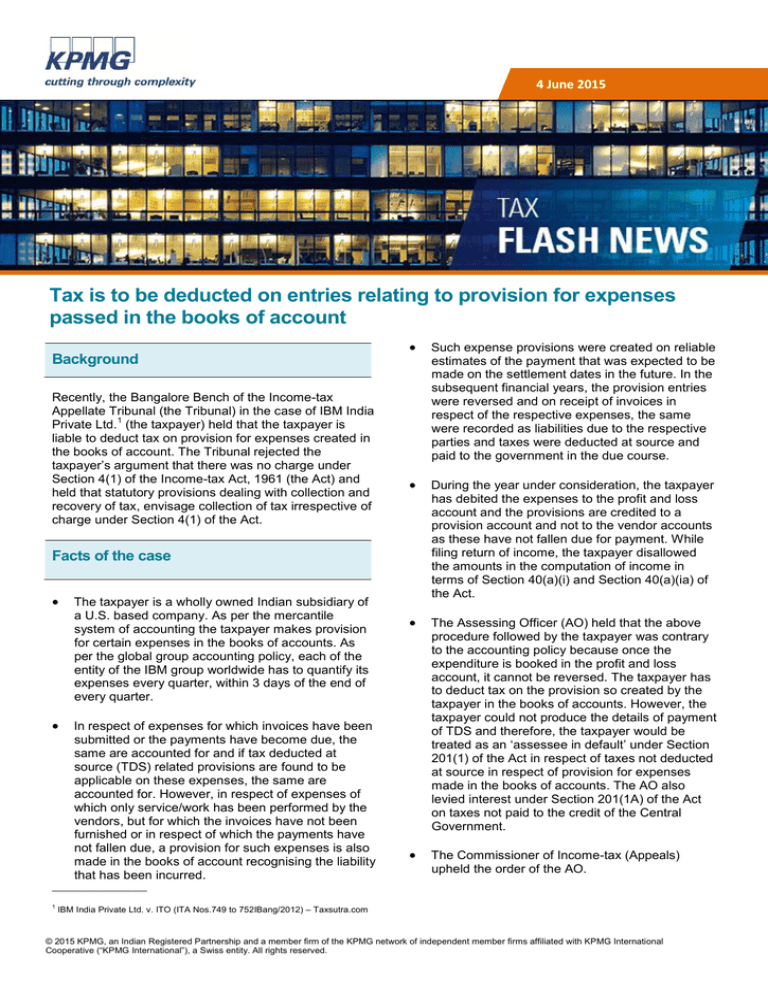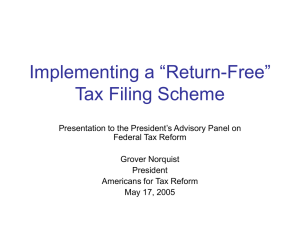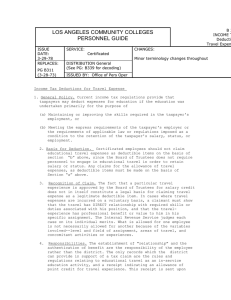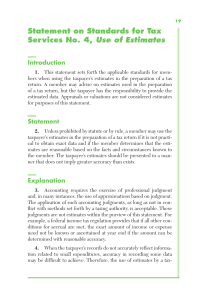
KPMG FLASH NEWS
KPMG in India
4 June 2015
Tax is to be deducted on entries relating to provision for expenses
passed in the books of account
Background
Recently, the Bangalore Bench of the Income-tax
Appellate Tribunal (the Tribunal) in the case of IBM India
1
Private Ltd. (the taxpayer) held that the taxpayer is
liable to deduct tax on provision for expenses created in
the books of account. The Tribunal rejected the
taxpayer’s argument that there was no charge under
Section 4(1) of the Income-tax Act, 1961 (the Act) and
held that statutory provisions dealing with collection and
recovery of tax, envisage collection of tax irrespective of
charge under Section 4(1) of the Act.
Such expense provisions were created on reliable
estimates of the payment that was expected to be
made on the settlement dates in the future. In the
subsequent financial years, the provision entries
were reversed and on receipt of invoices in
respect of the respective expenses, the same
were recorded as liabilities due to the respective
parties and taxes were deducted at source and
paid to the government in the due course.
During the year under consideration, the taxpayer
has debited the expenses to the profit and loss
account and the provisions are credited to a
provision account and not to the vendor accounts
as these have not fallen due for payment. While
filing return of income, the taxpayer disallowed
the amounts in the computation of income in
terms of Section 40(a)(i) and Section 40(a)(ia) of
the Act.
The Assessing Officer (AO) held that the above
procedure followed by the taxpayer was contrary
to the accounting policy because once the
expenditure is booked in the profit and loss
account, it cannot be reversed. The taxpayer has
to deduct tax on the provision so created by the
taxpayer in the books of accounts. However, the
taxpayer could not produce the details of payment
of TDS and therefore, the taxpayer would be
treated as an ‘assessee in default’ under Section
201(1) of the Act in respect of taxes not deducted
at source in respect of provision for expenses
made in the books of accounts. The AO also
levied interest under Section 201(1A) of the Act
on taxes not paid to the credit of the Central
Government.
The Commissioner of Income-tax (Appeals)
upheld the order of the AO.
Facts of the case
The taxpayer is a wholly owned Indian subsidiary of
a U.S. based company. As per the mercantile
system of accounting the taxpayer makes provision
for certain expenses in the books of accounts. As
per the global group accounting policy, each of the
entity of the IBM group worldwide has to quantify its
expenses every quarter, within 3 days of the end of
every quarter.
In respect of expenses for which invoices have been
submitted or the payments have become due, the
same are accounted for and if tax deducted at
source (TDS) related provisions are found to be
applicable on these expenses, the same are
accounted for. However, in respect of expenses of
which only service/work has been performed by the
vendors, but for which the invoices have not been
furnished or in respect of which the payments have
not fallen due, a provision for such expenses is also
made in the books of account recognising the liability
that has been incurred.
___________________
1
IBM India Private Ltd. v. ITO (ITA Nos.749 to 752IBang/2012) – Taxsutra.com
© 2015 KPMG, an Indian Registered Partnership and a member firm of the KPMG network of independent member firms affiliated with KPMG International
Cooperative (“KPMG International”), a Swiss entity. All rights reserved.
he argument of the taxpayer that TDS provisions
operate on income and not on payment is
erroneous. Section 194C, 194J and 195 of the
Act, which are the sections applicable in the
present case, do not use the expression,
‘Income’. The above sections use the expression
‘Sum’ and tax deduction has to be on the ‘sum so
paid’.
Section 194H and Section194-I deals with TDS
obligation on payment of commission and rental
income. These payments by its nature are
specific and the entire payment is attributable to
commission or rent and therefore the commission
and rent paid are treated as ‘income’. Therefore,
the expression income by way of commission or
rent is found in these sections. Moreover, as a
person responsible for making payment, it is the
duty of the taxpayer to deduct tax at source.
Section 194C, 194J, 194H and 194-I do not use
the expression ‘chargeable to tax’. It has been
noted that, it is not the case of the taxpayer that
the payments are not chargeable to tax in the
hands of the payee.
The taxpayer deducted tax on the provision made
for various expenses in the subsequent financial
years when the provision entries were reversed.
The taxpayer therefore cannot take a plea that the
payments in question are not chargeable to tax
and therefore there was no obligation on its part
to deduct tax at source.
The CBDT Circular is a specific circular
applicable in the case of banks and issued under
peculiar circumstances. The taxpayer cannot take
shelter under the said circular. Further, various
4
decisions relied on by the taxpayer are
distinguishable on the facts of the present case.
Accordingly, the levy of interest under Section
201(1A) of the Act has been upheld.
Tribunal’s ruling
Once there is a disallowance under Section 40(a)(i)
and (ia) of the Act, it is not possible to argue that
there was no liability under Chapter XVII-B of the Act
and therefore the provisions of Section 201(1) of the
Act will not be attracted.
It is clear from the statutory provisions of TDS that
the liability to deduct tax at source exists when the
amount is credited to a ‘suspense account’ or any
other account by whatever name called, which will
also include a ‘provision’ created in the books of
accounts. Thus, it is not possible for the taxpayer to
argue that there was no accrual of expenditure in
accordance with the mercantile system of account
and therefore the TDS obligations do not get
triggered.
The Tribunal did not agree with regard to the
taxpayer’s argument that there is no accrual of
expenditure as per the mercantile system of
accounting since the payee is not identified. The
CIT(A) has correctly held that under the mercantile
system of accounting accrual of liability for any
expenditure is not dependent of receipt of invoice
from the person to whom payment for expenses has
to be made.
The claim of the taxpayer that it creates provision in
the books of account on an estimated basis in some
cases, on a historical basis in other and using some
sort of arithmetical or geometric progression in some
other cases was not acceptable.
Section 190(2) of the Act provides that ‘Nothing in
Section 190 shall prejudice the charge of tax on such
income under the provisions of Section 4(1) of the
Act.’ Therefore, the statutory provisions clearly
2
envisage collection at source de hors the charge
under Section 4(1) of the Act.
Section 195 of the Act uses the expression
‘chargeable to tax’. In the present case, it is neither
the case of the taxpayer that payments made to nonresidents are not chargeable to tax nor has the
taxpayer been able to demonstrate as to how
payment made to a non-resident is not chargeable to
tax. The taxpayer is a person making payment and
the simple obligation cast upon him is to deduct a
sum specified by the Act from and out of the
payment and remit to the credit of the Central
Government.
3
Our comments
The Bangalore Tribunal in this case dealt with the
issue of levy of interest under Section 201(1A) vis-àvis applicability of TDS provisions on entries relating
to provision for expenses passed in the books of
account. The Tribunal held that the statutory
____________
3
CBDT Circular No.30/2010, dated 2 March 2010
DCIT v. Telco Construction Equipment Co. Ltd. (ITA No.478/Bang/2012),
DCIT v. Yeota Merchants Co-op. Bank Ltd. (ITA No. 805/PN/2011), Bovis
Lend Lease (I) Pvt. Ltd. v. ITO [2010] 36 SOT 166 (Bang), Bharati Airtel
Limited (ITA No.637-644 of 2013), UCO Bank v. UOI & others [2014] 369
ITR 335 (Del)
4
_____________
2
Out of, without.
© 2015 KPMG, an Indian Registered Partnership and a member firm of the KPMG network of independent member firms affiliated with KPMG International
Cooperative (“KPMG International”), a Swiss entity. All rights reserved.
provisions of withholding tax clearly envisage deduction
of tax at source de hors the charge under Section 4(1) of
the Act. Further, Section 194C, 194J, 194H and 194-I
do not use the expression ‘chargeable to tax’, and
Section 194C, 194J and 195 of the Act, do not use the
expression, ‘Income’. The above sections use the
expression ‘Sum’ and tax deduction has to be on the
sum so paid. Accordingly, the taxpayer was liable to
deduct tax at source on entries relating to provision for
expenses passed in the books of account.
In some of the cases, the parties with whom the
taxpayer is entering into a transaction with may not have
been identified when the provision for certain expenses
is created. At times, it is difficult to quantify the amount
of expenditure which is going to be incurred. In view of
these practical difficulties, the deductor could face
hardship if he has to comply with the TDS provisions.
© 2015 KPMG, an Indian Registered Partnership and a member firm of the KPMG network of independent member firms affiliated with KPMG International
Cooperative (“KPMG International”), a Swiss entity. All rights reserved.
www.kpmg.com/in
Ahmedabad
Commerce House V, 9th Floor,
902 & 903, Near Vodafone House,
Corporate Road,
Prahlad Nagar,
Ahmedabad – 380 051
Tel: +91 79 4040 2200
Fax: +91 79 4040 2244
Bengaluru
Maruthi Info-Tech Centre
11-12/1, Inner Ring Road
Koramangala, Bangalore 560 071
Tel: +91 80 3980 6000
Fax: +91 80 3980 6999
Chandigarh
SCO 22-23 (Ist Floor)
Sector 8C, Madhya Marg
Chandigarh 160 009
Tel: +91 172 393 5777/781
Fax: +91 172 393 5780
Chennai
No.10, Mahatma Gandhi Road
Nungambakkam
Chennai 600 034
Tel: +91 44 3914 5000
Fax: +91 44 3914 5999
Delhi
Building No.10, 8th Floor
DLF Cyber City, Phase II
Gurgaon, Haryana 122 002
Tel: +91 124 307 4000
Fax: +91 124 254 9101
Mumbai
Lodha Excelus, Apollo Mills
N. M. Joshi Marg
Mahalaxmi, Mumbai 400 011
Tel: +91 22 3989 6000
Fax: +91 22 3983 6000
Hyderabad
8-2-618/2
Reliance Humsafar, 4th Floor
Road No.11, Banjara Hills
Hyderabad 500 034
Tel: +91 40 3046 5000
Fax: +91 40 3046 5299
Noida
6th Floor, Tower A
Advant Navis Business Park
Plot No. 07, Sector 142
Noida Express Way
Noida 201 305
Tel: +91 0120 386 8000
Fax: +91 0120 386 8999
Kochi
Syama Business Center
3rd Floor, NH By Pass Road,
Vytilla, Kochi – 682019
Tel: +91 484 302 7000
Fax: +91 484 302 7001
Pune
703, Godrej Castlemaine
Bund Garden
Pune 411 001
Tel: +91 20 3050 4000
Fax: +91 20 3050 4010
Kolkata
Unit No. 603 – 604,
6th Floor, Tower – 1,
Godrej Waterside,
Sector – V, Salt Lake,
Kolkata 700 091
Tel: +91 33 44034000
Fax: +91 33 44034199
© 2015 KPMG, an Indian Registered Partnership and a member firm of the KPMG network of independent member firms affiliated with KPMG International
Cooperative (“KPMG International”), a Swiss entity. All rights reserved.





